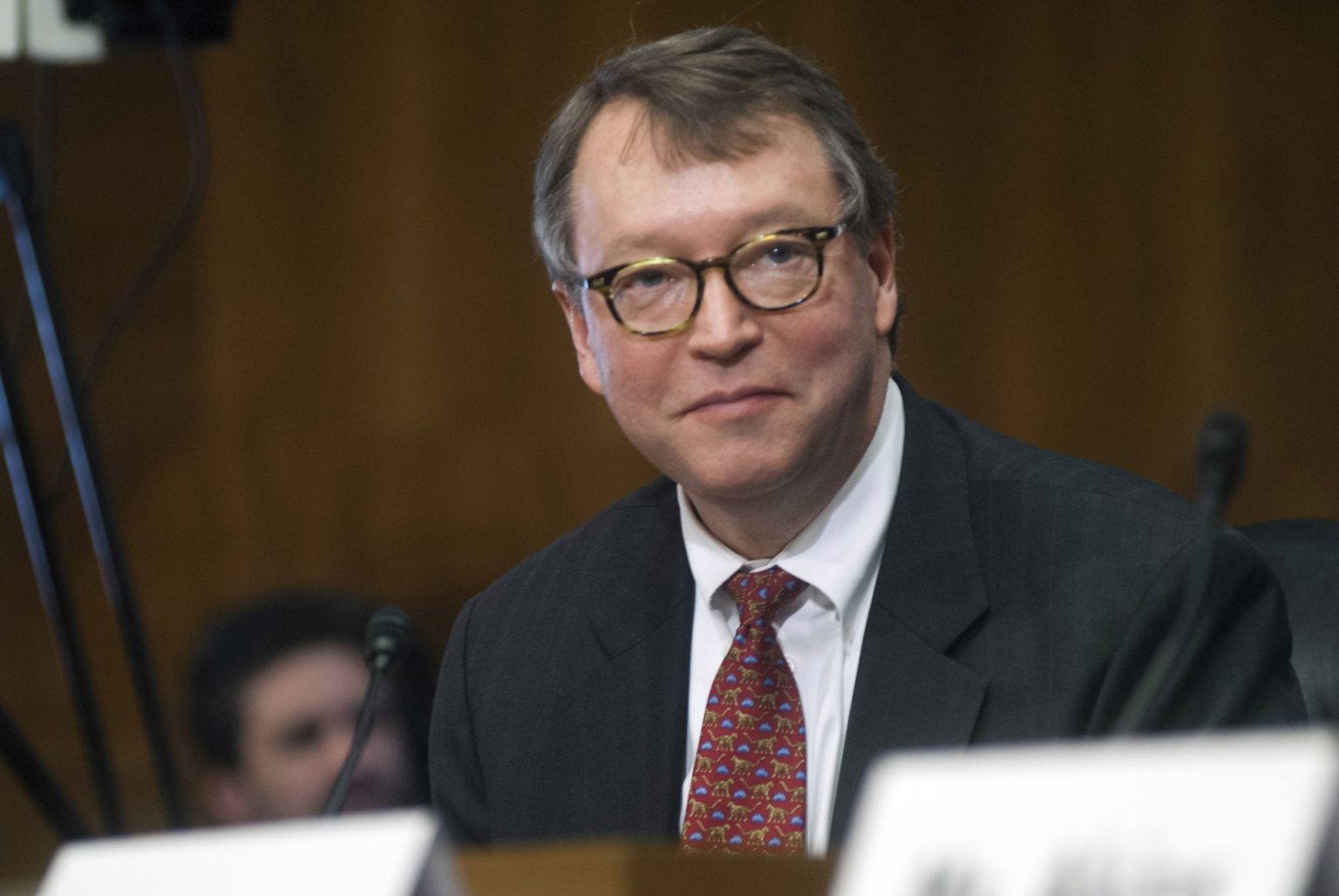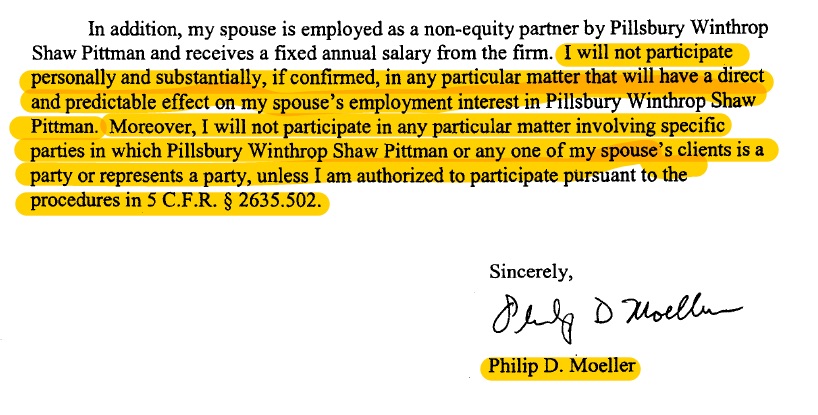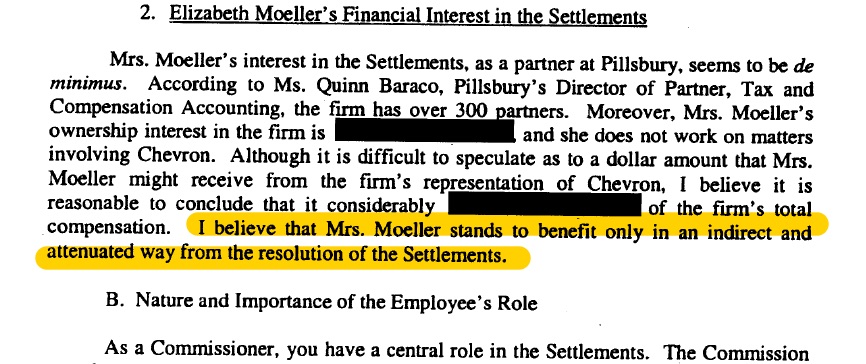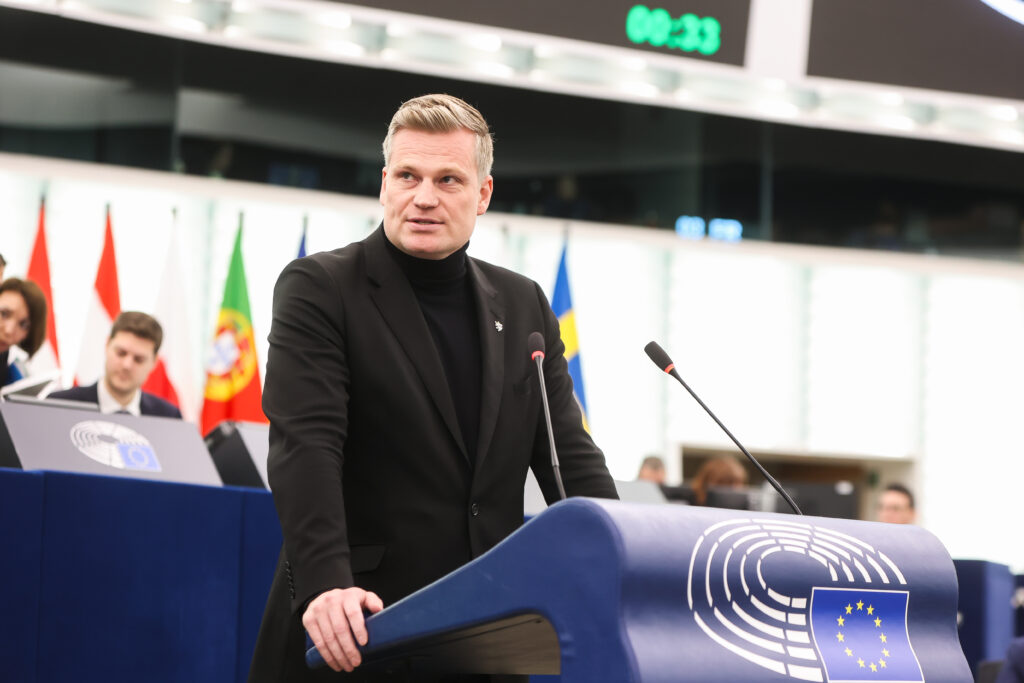Numerous rulings by a former Commissioner of the Federal Energy Regulatory Commission (FERC) favored energy companies his lobbyist wife worked for at the time, a DeSmog investigation can reveal.
Philip Moeller left FERC in late 2015 after nearly ten years on the Commission.
Throughout his entire tenure, Moeller’s wife, Elizabeth Moeller, was employed as a lawyer and lobbyist for the Washington DC-based firm Pillsbury, Winthrop, Shaw & Pittman LLP (Pillsbury Winthrop).
According to internal FERC documents obtained by DeSmog, the Commission’s counsel repeatedly authorized Moeller to rule on matters concerning companies represented by his wife or others at Pillsbury Winthrop.
Elizabeth Moeller’s Timely Move to Pillsbury Winthrop
A month before Moeller was nominated by President George W. Bush to FERC in March 2006, Elizabeth Moeller, a veteran Capitol Hill lobbyist, moved from the firm of Squire Patton to Pillsbury Winthrop.
One of her first clients at the new firm was Puget Sound Energy (PSE), a FERC-regulated utility providing electricity and gas to more than a million costumers in the Northwest.
According to congressional disclosure documents, Elizabeth Moeller had consistently lobbied for PSE from April 2006 to April 2014 on various issues relating to climate change, energy policy, and taxation. During the same time span, Commisioner Moeller sat on many FERC rulings involving PSE, where he ruled in favor of the company.
In 2007, Moeller and the Commission approved the upgrade and expansion of a PSE storage facility.
A year later, they approved PSE’s merger with a consortium led by the investment firm Macquarie.
Soon after, Moeller was involved in approving PSE’s purchase of Sumas Pipeline Company’s natural gas import facility in Whatcom County, Washington.
In 2011, FERC approved PSE’s rate increase. Two years later, Moeller approved PSE’s new service agreements with Morgan Stanley Capital.
FERC Allows Moeller to Sit on Rulings
When first nominated to FERC, Moeller disclosed to the Commission the conflict relating to his wife’s work.
In a letter to FERC’s Designated Agency Ethics Official, Moeller stated he would “not participate personally and substantially, if confirmed, in any particular matter that will have a direct and predictable effect on my spouse’s employment interest in Pillsbury Winthrop Shaw Pittman.”
Office of Government Ethics rules strictly forbid public officials from working on matters where they have a personal financial stake, unless authorized in writing by the agency’s Ethics Official.
Excerpt from Commissioner Moeller disclosure statement, March 2006
Internal FERC memoranda show the Commission’s legal staff repeatedly authorized Moeller to participate in rulings involving companies represented by Pillsbury Winthrop.
In February 2007, only months after his appointment to FERC, Moeller asked the Commission’s Ethics Official for a blanket waiver to participate in matters involving companies represented by his wife or Pillsbury Winthrop. The waiver was on the condition that neither Elizabeth Moeller or Pillsbury Winthrop was participating directly in the issue before the commission.
The official granted the waiver, arguing “[I] believe it is highly unlikely your Commission decisions in matters that involve your wife’s or Pillsbury’s clients, when represented by other counsel, would have any affect on the financial interests of either your wife or of Pillsbury.”
The Ethics Official also cited Moeller’s unique role in the regulatory process. “As a result, your role cannot be performed by another Commission employee and you should not be recused unnecessarily.”
Soon after, in early 2008, Moeller asked FERC’s counsel to participate in several rulings concerning PSE.
Even though Elizabeth Moeller was already lobbying for PSE at the time, FERC allowed him to participate after verifying that neither she nor her firm was directly participating in the specific matters before the Commission concerning PSE.
FERC’s counsel wrote, “in my view, these matters will not have any direct and predictable effect on the Moeller’s finances.”
In one of the rulings concerning PSE, Moeller stated: “Transparency in the Commission’s process is necessary in light of our significant enforcement authority.”
In late 2009 Moeller asked FERC for a waiver to participate in pending settlement rulings relating to California’s energy crisis of 2000-2001, where one of the parties in the matter, Chevron, was being represented by Pillsbury Winthrop.
Oddly, at the time Moeller told FERC’s counsel he was unaware his wife had become an equity partner at Pillsbury Winthrop 11 months earlier. This means Elizabeth Moeller automatically benefited financially with every increase in her firm’s total income.
Still, FERC granted him the waiver to participate in the settlements, saying: “Mrs. Moeller stands to benefit only in an indirect and attenuated way from the resolution of the Settlements.”
The Commission also cited the need to maintain a quorum of commissioners in such matters.
From a 2009 internal FERC memorandum, authorizing Commissioner Moeller to rule on matters involving companies represented by Pillsbury Winthrop
In 2012, Moeller was again authorized to rule in similar settlements involving Chevron. FERC’s counsel reasoned that “Mrs. Moeller does not work on matters involving Chevron, and has recently been ‘walled off’ from any profits received from the firm’s FERC’s practice.”
Elizabeth Moeller’s Fracking and Coal Clients
Yet during these years Elizabeth Moeller represented other energy clients, of which there’s no evidence her husband asked for waivers to his obligated recusal.
In 2010, Elizabeth Moeller began lobbying for Mitsui Oil Exploration shortly after the company purchased agreements to drill for natural gas in Pennsylvania’s Marcellus Shale.
Soon afterwards, Moeller and the Commission approved a number of new natural gas projects in the Northeast carrying fracked gas from the Marcellus Shale. These include Spectra Energy’s Texas Eastern Appalachia to Market project and New Jersey-New York Expansion project.
During her husband’s tenure as FERC Commissioner, Elizabeth Moeller also lobbied for Laurus Energy, which develops underground coal gasification. Apart from her lobbying activities, she serves on the Board of Directors of General Synfuels International (GSI), an oil shale gasification company.
DeSmog could not find evidence of any instance where Moeller recused himself from rulings involving his wife’s clients.
A FERC spokesperson declined to comment and referred DeSmog to former Commissioner Moeller.
DeSmog was unable to contact Moeller directly but Brian Reil, a spokesperson at Edison Electric Institute, where Moeller currently works, said: “Mr. Moeller followed the law with an abundance of caution and in accordance and consultation with FERC‘s ethics office. Regarding Liquefied Natural Gas Ltd., Mr. Moeller was only approached after he announced he was leaving FERC and was then recused on issues involving the company during his remaining time at FERC.”
DeSmog also requested comment from Elizabeth Moeller, but got not response.
Philip Moeller’s Own Revolving Doors
Moeller himself embodies the revolving door phenomenon, where public servants move seamlessly to and from the private sector, potentially blurring their allegiances and interests.
In the years before his nomination to FERC, he worked as lobbyist for Alliant Energy and Calpine Corporation.
Moeller also chaired the Federal Affairs Executive Committee for Edison Electric Institute, a national utilities trade and lobbying group.
Soon after leaving FERC in October 2015, Moeller went back to work for the industry he had until recently regulated.
Within three months of his departure, Moeller rejoined Edison Electric Institute, this time as Senior Vice President of Energy Delivery and Chief Customer Solutions Officer.
Moeller Joins LNG Company Board – Lobbied for by his Old Colleague
Moeller then joined the Board of Directors of Liquified Natural Gas Ltd., an Australian company developing several LNG export terminals worldwide.
Liquified Natural Gas Ltd is currently awaiting FERC’s approval for its Magnolia LNG, a large terminal in Lake Charles, Louisiana. Liquified Natural Gas Ltd’s subsidiary for the project, Magnolia LNG, began its FERC review process in 2013, when Moeller still served as Commissioner.
The company has hired the firm K&L Gates to both manage its FERC application, and provide lobbying services.
One of Magnolia’s lobbyists from K&L Gates is Moeller’s ex-boss and longtime friend, former US-Senator Slade Gorton. Moeller worked as Gorton’s Energy Advisor when the former served in the Senate.
Lobbying disclosure documents show K&L Gates registered specifically to lobby on Magnolia LNG’s behalf to “[L]icense application with Federal Energy Regulatory Commission,” and that the entities it lobbied included FERC. Gorton himself lobbied on Magnolia LNG’s behalf in early 2015, while Moeller still served at FERC.
Within less than a year, Moeller would switch sides and join the Board of Magnolia LNG’s parent company.
Slade Gorton told DeSmog that although his firm K&L Gates listed him as a lobbyist for Magnolia LNG, he has “absolutely no memory of ever lobbying for LNG Ltd on any subject.”
As to his current relationship with Philip Moeller, Gorton, says he was “an outstanding member of my Senate staff whom I am delighted to see once or twice a year.”
In another project, Liquified Natural Gas Ltd recently announced it will connect its planned Bear Head LNG terminal in Canada’s Novia Scotia to a Spectra Energy pipeline in the Northeast US.
Spectra’s recent major upgrade to its New England pipeline – Algonquin Incremental Market (AIM) – was approved by Moeller and the Commission in March 2015.
As DeSmog first reported, the environmental review processes for Spectra’s new natural gas projects in the region is mired with alleged conflicts of interest.
The contractor hired by FERC to assess the impacts of the company’s AIM and Atlantic Bridge projects – Natural Resource Group (NRG) – was already working directly for Spectra on related pipelines, suggesting it had a financial interest in approving the projects it was called upon to review independently.
Main image: Former FERC Commissioner, Philip Moeller. Source: Flickr/FERC
Subscribe to our newsletter
Stay up to date with DeSmog news and alerts









